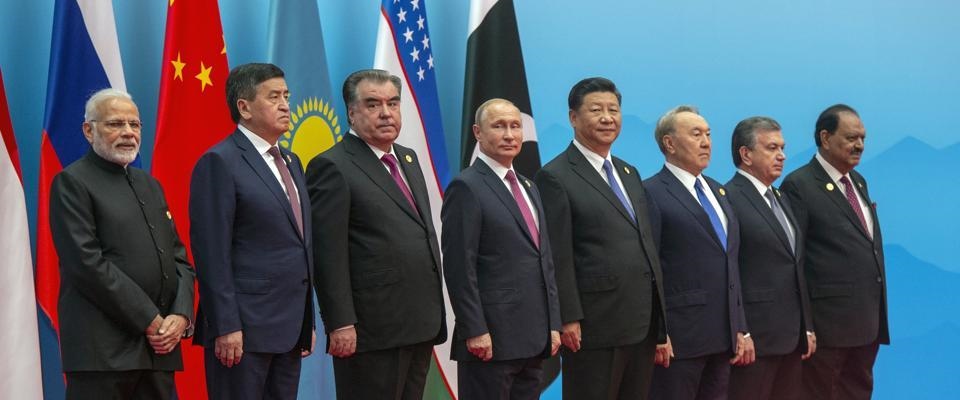SCO: The Eurasian Power shift
June 11, 2018 | Expert Insights

The Shanghai Cooperation Council held its annual summit in China’s Qingdao to discuss new strategies for economic cooperation and security practices on the 9th and 10th of June.
The SCO Summit’s success was in sharp contrast to the disarray of the G7 meeting held at the same time.
Background
Originally organized as the Shanghai Five comprising China, Russia, Kazakhstan, Kyrgyzstan, Tajikistan in 1996, the organization added Uzbekistan in 2001 and renamed itself the Shanghai Cooperation Organization. India has been an ‘observer state’ since 2005 and applied for full membership in the year 2014, alongside Pakistan. Both countries have been admitted as full time members since June of 2017. In terms of population and geographical coverage, the Shanghai Cooperation Organization (SCO) is one of the largest regional organizations in the world.
The organization, although not a military one, fosters cooperation among members to promote security and trade in the region. One of the organization’s primary objectives is promoting cooperation on security-related issues, namely to combat the “three evils” of terrorism, separatism, and extremism. The Diplomat reported in 2017 that SCO has foiled 600 terror plots and extradited 500 terrorists through RATS (Regional Antiterrorism Structure). Members have participated in multiple SCO joint military exercises.
The Sino-Russia led regional bloc is an increasingly powerful counterweight to NATO, but faces institutional weaknesses owing to lack of funds and conflicting national interests.
Add: shanghai spirit
Analysis
The Eurasian regional bloc released the Qingdao Declaration, the main political document, outlining the members’ plans and processes for the coming years. The document highlighted the importance of disarmament, arms control and establishing a nuclear weapons free zone in Central Asia. They agreed that increasing and improving intelligence information exchange amongst member states would be central to tackling foreign and homegrown terrorists. Member states have maintained the importance on reduction of drug trafficking within Eurasia.
Following the SCO-Afghanistan Contact Group meeting in Beijing on 28th May, the SCO reiterated the importance of ensuring peace within the state of Afghanistan in ai spirorder to prevent the spillover of terrorism activities into other countries. The Syrian crisis was duly acknowledged as the Declaration asserted the importance of the Astana Peace Process (negotiations held in Kazakhstan’s Astana to bring an end to the Syrian civil war).
India took advantage of her newly acquired membership to sign agreements with China in the spheres of trade and security. In order to reduce India’s mounting trade deficit with China, the latter has agreed to increase in agricultural exports, including non-Basmati rice. China also renewed the agreement to share hydrological data on the Brahmaputra. However, India was the only nation not to endorse China’s Belt and Road Initiative but stated they would support any trade project which would not encroach on sovereign territory.
China’s ambitious aim to provide loans up to $4.7 billion under the SCO framework demonstrates the country’s commitment to the organisation. China said they reject “selfish, shortsighted” trade policies without naming the US with whom they are facing a tariff war worth up to $150 million each.
The summit’s success juxtaposed the discord at the G7 meeting held at the same time. "The West, the G7, which doesn't include China nor Russia, is kind of struggling not just with the rest of the world but now they start to struggle with each other,” said Michele Geraci, the head of Nottingham University's China economic policy programme. Moscow’s 2014 suspension from the G8 has skewed global politics, but Putin stated that the purchasing power of SCO outstripped that of the G7, according to a report from Al-Jazeera.
According to Zbigniew Brzezinski's theory, control of the Eurasian landmass is the key to global domination and control of Central Asia is the key to control of the Eurasian landmass. China and Russia’s domineering role within the SCO highlights their combined capability of disrupting the Western, NATO-led hegemony. Some experts believe that recent moves by Beijing and Moscow, including the agreement to harmonize China’s Silk Road Economic Belt and Russia’s Eurasian Economic Union and bilateral military exercises in the Mediterranean Sea, signal an entente between the two regional powers. Simultaneously, however, any Russo-Chinese conflicts might create obstacles to achieving a Eurasian centric power structure.
Assessment
Our assessment is that the SCO has demonstrated the Eurasian organization’s rising role and increasing influence in the world. We believe that the SCO leaders have taken proactive steps to deepen their partnership for peace, cooperation, equality, openness, and inclusiveness. Over the 17 years since its foundation, the SCO has adhered to its core principle, the “Shanghai Spirit”, which features mutual trust, mutual benefit, equality, consultation, respect for cultural diversity, and pursuit of common development.








Comments